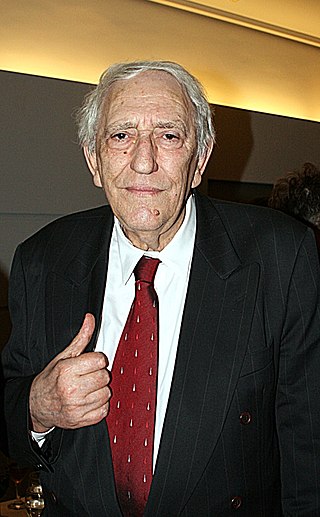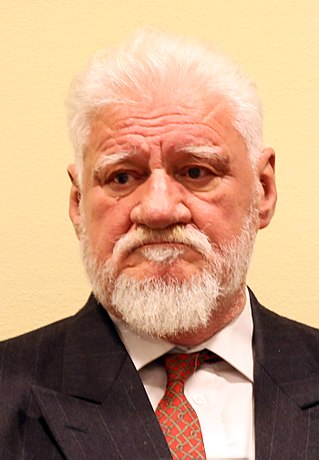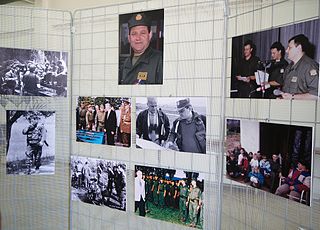Contents
| |||||
| Decades: | |||||
|---|---|---|---|---|---|
| See also: | |||||
Events in the year 2017 in Croatia .
| |||||
| Decades: | |||||
|---|---|---|---|---|---|
| See also: | |||||
Events in the year 2017 in Croatia .




The International Criminal Tribunal for the former Yugoslavia (ICTY) was a body of the United Nations that was established to prosecute the war crimes that had been committed during the Yugoslav Wars and to try their perpetrators. The tribunal was an ad hoc court located in The Hague, Netherlands.

Ivo Sanader is a Croatian former politician who served as Prime Minister of Croatia from 2003 to 2009. He is currently serving a 18-year prison sentence for corruption in Lipovica prison.

Ante Gotovina is a Croatian retired lieutenant general and former French senior corporal who served in the Croatian War for Independence. He is noted for his primary role in the 1995 Operation Storm. In 2001, the International Criminal Tribunal for the former Yugoslavia (ICTY) indicted him on war crimes and crimes against humanity charges in connection with that operation and its aftermath. After spending four years in hiding, he was captured in the Canary Islands in December 2005.

Ivan "Ivo" Brešan was a Croatian and Yugoslav playwright, novelist and screenwriter, known for political satire. His works include screenplays written with his son Vinko.
The Death of Yugoslavia is a BBC documentary series first broadcast in September and October 1995, and returning in June 1996. It is also the title of a BBC book by Allan Little and Laura Silber that accompanies the series. It covers the collapse of Yugoslavia, the subsequent wars and the signing of the final peace accords. It uses a combination of archived footage interspersed with interviews with most of the main players in the conflict, including Slobodan Milošević, Radovan Karadžić, Franjo Tuđman and Alija Izetbegović, as well as members of the international political community, who were active in the various peace initiatives.

Jadranko Prlić is a Bosnian Croat politician who served as Prime Minister of the Croatian Republic of Herzeg-Bosnia, an unrecognized entity within Bosnia and Herzegovina, from 1993 to 1996. From 1994 to 1996, he was the Federal Minister of Defence and from 1997 to 2001, the first Minister of Foreign Affairs after the Dayton Agreement.
Agrokor was a conglomerate, largely centered in agribusiness, with headquarters in Zagreb, Croatia. Founded in 1976 as a flower grower, it became a joint stock company in 1989, with 100 percent ownership held by founder Ivica Todorić. It greatly expanded its operations in the following 25 years by acquiring several large companies in Croatia and Southeast Europe. The Agrokor group had an annual sales revenue of €6.465 billion in 2015, which made it the second-largest retail and eleventh-largest overall company in all of Southeast Europe. As of 31 December 2017, Agrokor employed around 50,900 people. On 1 April 2019, the assets of the demised Agrokor were consolidated within the newly founded Fortenova Group.

Bruno Stojić is a Bosnian Croat politician convicted by the International Criminal Tribunal for the former Yugoslavia (ICTY). His trial, joined with five co-accused Bosnian-Croat politicians active in the Croatian Republic of Herzeg-Bosnia wartime entity, ended with him being found guilty and sentenced to 20 years in prison.

Slobodan Praljak was a Bosnian Croat war criminal who served in the Croatian Army and the Croatian Defence Council, an army of the Croatian Republic of Herzeg-Bosnia, between 1992 and 1995. Praljak was found guilty of committing violations of the laws of war, crimes against humanity, and breaches of the Geneva Conventions during the Croat–Bosniak War by the International Criminal Tribunal for the former Yugoslavia (ICTY) in 2017.

The Heliodrom camp or Heliodrom prison was a detention camp that operated between September 1992 and April 1994. It was run by the Military Police of the Croatian Republic of Herzeg-Bosnia to detain Bosniaks, Serbs, and other non-Croats and was located at a former military facility of the JNA in Rodoč, south of the town of Mostar.
The Bosnian War attracted large numbers of foreign fighters and mercenaries from various countries. Volunteers came to fight for a variety of reasons including religious or ethnic loyalties, but mostly for money. Generally, Bosniaks received support from Muslim countries, Serbs from Eastern Orthodox countries, and Croats from Catholic countries. The numbers, activities and significance of the foreign fighters were often misrepresented. However, none of these groups constituted more than five percent of any of the respective armies' total manpower strength.

Predrag Matvejević was a Bosnian and Croatian writer and scholar. A literature scholar who taught at universities in Zagreb, Paris and Rome, he is best known for his 1987 non-fiction book Mediterranean: A Cultural Landscape, a seminal work of cultural history of the Mediterranean region which has been translated into more than 20 languages.

Mladen Markač is a Croatian retired general. He was a Commander of Croatian Special Police during Operation Storm during the Croatian War of Independence (1991–1995), and afterwards held the rank of Colonel General. Later, he was indicted by the International Criminal Tribunal for the Former Yugoslavia (ICTY) for war crimes committed during Operation Storm by Croatian forces against the Serbs from Croatia. In April 2011, the ICTY found him guilty and sentenced him to 18 years.

The Croat–Bosniak War was a conflict between the Republic of Bosnia and Herzegovina and the Croatian Community of Herzeg-Bosnia, supported by Croatia, that lasted from 19 June 1992 – 23 February 1994. The Croat-Bosniak War is often referred to as a "war within a war" because it was part of the larger Bosnian War.
The Stupni Do massacre was a massacre committed by Croatian forces on Bosniak civilians during the Croat–Bosniak war in the village of Stupni Do in Vareš municipality. It was committed on 23 October 1993 by Croatian Defence Council (HVO) units called "Apostoli" and "Maturice" led by Ivica Rajić, who pleaded guilty before ICTY for war crimes in October 2005. The Croat forces took control of the village and massacred most of the captured people. They raped the women before killing them and looted all houses before setting them on fire. The number of victims is at least 37-44.
The Duša killings refers to the shelling of the village of Duša, Gornji Vakuf by the Croatian Defence Council on 18 January 1993, in which 7 Bosniak civilians were killed. Bosniak homes were burnt down after the HVO took control of the village.

Mladen Naletilić was a Bosnian Croat paramilitary commander of the "Convicts' Battalion" of the Croatian Defence Council (HVO) convicted for war crimes by the ICTY.
The Open Letter on the Position and Status of Serbs in Croatia was sent to the addresses of prominent Croatians and Serbians in September 2008. The letter spoke about the adverse social and economic circumstances in which Croatian Serbs had lived.

Split Pride is the LGBT pride march in the Croatian city of Split. Split was the second city in Croatia after Zagreb to get its LGBT pride, with the first taking place on the 11 June 2011.
V.B.Z. d.o.o. is a Croatian publishing company including bookstores and online sale.